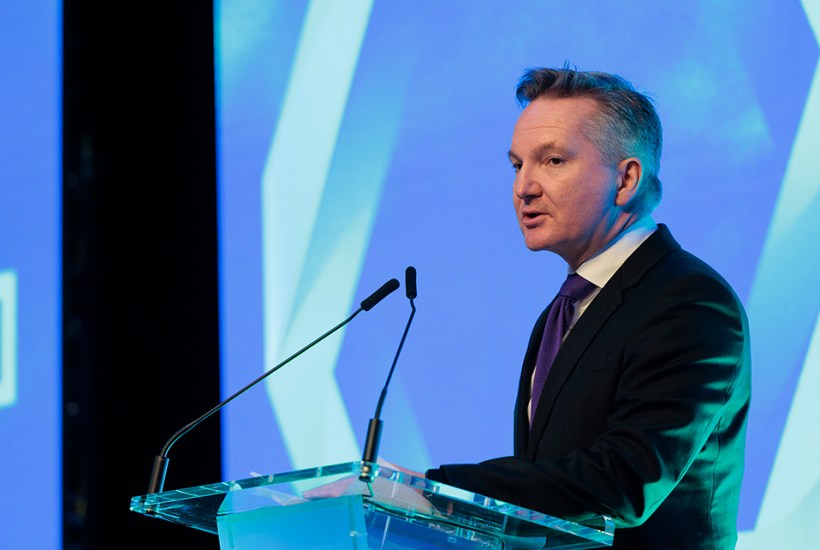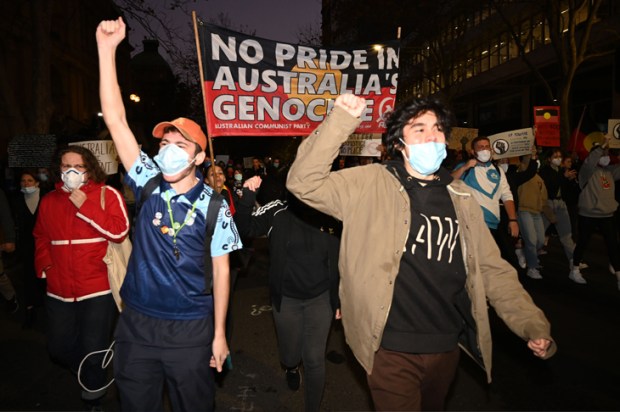Chris Bowen and his eco-maniac Labor/Green/Teal mates have just now quietly acquired the official ALP policy weapons needed to mount a serious campaign to kill off Australia’s major sources of energy and foreign income, coal and gas. With gas now acknowledged as the vital element in Australia’s masochistic move out of its cheapest and plentiful energy source – coal – the Bowen blitz on gas puts our economy in jeopardy, our budget outlook in tatters and our Asian allies’ energy security at risk. For coal, the risk may be more symbolic – but still exposes it to greater internal Labor attack
How come nobody noticed this ideological assault – apart from some perceptive items in the Australian Financial Review? And even these did not join the dots to reveal the extent of the emission-obsessed Bowen’s triumph over his cabinet colleague, the humiliated Resources Minister Madeleine King with her almost rational approach to climate change (to the extent that such is possible on the government benches).
For coal, some may see the recent ALP national conference’s policy repudiation by removing coal from the list of industries it previously supported as simply a political stunt aimed at protecting top ministers in inner-city green-leaning seats. However, Labor’s eco-warriors are now free of any policy inhibitions in seeking to kill coal. But the implications of the national conference’s changed policy on gas are far more significant – with both local economic and international strategic implications.
The sneaky success against gas has come in stages, with successive anti-gas moves having a cumulative impact – and accompanied by the idiocy of state Labor governments (and banks like the CBA) in doing their bit in discouraging the essential investment in new gas resources that are urgently needed to maintain our energy supplies as coal-power stations close – and to maintain the energy security of our gas-dependent Asian allies. Both the Australian Energy Market Operator and ACCC have said Australia’s future domestic gas needs will not be met through existing sources of supply. And the International Energy Agency recently acknowledged that even in its most ambitious transition scenarios, more new investment in gas resources will be needed
The eco-maniacs’ anti-gas ALP conference success (it was passed on the voices with a no vote, indicating governmental support) was on an issue that, on its own, would have raised few eyebrows. But it was in the context of the government’s new emissions-cutting ‘safeguard mechanism’. So the removal of previous ALP policy support for the use of carbon capture utilisation (CCUS) and storage ‘in ensuring industries like gas production are able to play their role in meeting carbon pollution reduction goals’, strikes a severe blow. From now on Labor policy limits support of CCUS to hard-to-abate industries such as cement. And this follows the withdrawal of $250 million of governmental financing of CCUS in last October’s budget. This sharp ideology-led reversal in Labor policy puts it out of step with significant support for this technology by the CSIRO and major global institutions including the International Energy Agency and Intergovernmental Panel for Climate Change along with European and US leaders.
This reversal removed the sole instrument by which Minister King had been assiduously assuring Australian fossil-fuel industries (and foreign investors) that Labor’s dreaded new safeguard mechanism, with its required and potentially costly emissions reductions for major gas projects, was capable of being successfully dealt with. Her line was that ‘the Safeguard Mechanism doesn’t just provide an incentive for new CCUS projects to meet abatement goals, it opens the possibility for the earning of Safeguard Mechanism credits if CCUS projects are successful in lowering emissions below baselines’. She reinforced this upbeat message at last May’s Australian Petroleum Production and Exploration Association conference stating that, ‘Perhaps the single biggest opportunity for emissions reduction in the energy resources sector is through Carbon Capture and Storage, which the International Energy Agency and Australia’s own Climate Change Authority make clear are a necessary and vital part of any rapid decarbonisation effort. CCUS represent an opportunity for Australia if we get it right’.
Well Labor has got it wrong and just hours after the removal of gas from the CCUS policy, King defiantly underlined her Labor colleagues wrong direction by telling ABC radio of the strong support abroad for ‘important carbon abatement projects like carbon capture, use and storage’ and that, ‘The US is doubling down into CCUS’.
Much of Australia’s necessarily expanding gas industry (underpinned by foreign investment particularly from Japan and Korea aimed at securing their gas supplies) has been betting heavily on resolving their anticipated emissions obligations by capturing and storing carbon. Already projects are under way in Australia led by Chevron’s Gorgon project and major investments by Santos at Moomba in South Australia. But Labor’s reversal on CCUS policy adds a new potential hurdle involving a crucial element in prospective major projects like Beetaloo, Narrabri and the controversial offshore Barossa. Even the Grattan Institute concedes that there would be a serious impact on major gas projects – and thereby put at risk the energy security of allies like Japan.
The Japanese, who depend on Australia for 40 per cent of their energy imports and on whom Australia has relied for major investments to develop our gas resources, had already expressed their concerns about the impact on energy exports of the Labor government’s emissions policies long before last month’s ALP conference. These were met last year by assurances, at prime ministerial level, that Australia would continue to be a reliable energy supplier – assurances now rendered highly questionable by these diplomatically disastrous policy changes.
Back in March, the head of Japan’s biggest oil and gas producer (and Japan’s biggest investor in Australia) was so worried by Australian governmental interventions in the gas industry that he warned of a deteriorating investment climate in Australia with an unintended consequence of Canberra’s attempts to control the gas industry being the risk of undermining global security through an apparent decision to ‘quietly quit’ the international gas trade. China’s embassy in Canberra added a similar complaint.
So why are climate warriors so determined to dismiss CCUS despite overwhelming expert agreement that emissions targets cannot be met without it? They blame carbon capture for perpetuating oil and gas operations that might otherwise be phased out faster. ‘Carbon capture is basically a way to keep oil, gas and coal going…. The longer we rely on fossil fuels, the longer we’re going to have climate problems, is the irrational ideological response in a world that currently cannot function without fossil fuels
And as for the gas industry’s plaintive cry back in May that, ‘We can’t let politics and ideology get in the way of sensible, evidence-based climate and energy policy’, under the Labor/Green/Teal eco-maniacs they have done so. And all Australia, not just the gas and coal industries, faces the consequences.
Got something to add? Join the discussion and comment below.
Get 10 issues for just $10
Subscribe to The Spectator Australia today for the next 10 magazine issues, plus full online access, for just $10.
You might disagree with half of it, but you’ll enjoy reading all of it. Try your first month for free, then just $2 a week for the remainder of your first year.














Comments
Don't miss out
Join the conversation with other Spectator Australia readers. Subscribe to leave a comment.
SUBSCRIBEAlready a subscriber? Log in